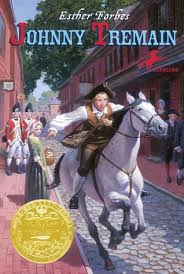Johnny Tremain
Listen to the Recess! Clip
| Author | Kevin Shortsleeve |
| Air Date | 4/22/2002 |

Johnny Tremain Transcript
As a source of literary inspiration, the American Revolution has inspired surprisingly few fictional tales that have stood the test of time. Unlike the Civil War, or World War II, action stories and adventure films have rarely successfully explored the war between the colonies and England. Films like Patriot, 1776 and April Morning have almost universally failed to inspire recognition from critics or the American public. One possible reason for this may lie in the fact that the enemy of old, England, is now, and has long been one of our closest allies.
The United States, is, in many ways, the child of Great Britain, and the American Revolution was our rebellious adolescence. Now grown to maturity, like adults who come to value the parents they rebelled against in youth, we Americans look on England with fondness as we recognize in them the vital link to our origins. And films like Patriot, which depict maniacal, even evil, British officers appear unrealistic to us. Perhaps then, it is the gray shades of the American Revolution -the thought that there is more to the story than just good and bad – that has often prevented its successful celebration in fiction.
An exception to this rule is Esther Forbes suspenseful tale of the child spy, Johnny Tremain. Packed with historical accuracy and realistic characters, Johnny Tremain masterfully explores the tension flowing through the pubs and secret back rooms of colonial Boston – following the adventure through the character of a thoughtful youth who witnesses, and plays key roles in, both The Boston Tea Party and The Battle of Lexington and Concord.
On the first page of Johnny Tremain, Forbes describes creatures awakening in and around the outskirts of Boston Harbor. She tells us of the gulls rising up from their rocky islands, roosters crying as the rising sun sets brass weather vanes flashing in the morning slant of sun – and children, tumbling from beds who are told, “Start the fire Silas, put on a clean shirt James.”
These images of a new day dawning – of youth roused to movement and enterprise – speak to us not only of a particular morning in Boston two hundred and thirty years ago – but of the dawn of a new era along the shores of the New World.
But it is a carefully balanced tale of ambiguous characters – both British and Colonial rhetoric realistically explored. It is perhaps this balanced outlook that has allowed Johnny Tremain to succeed where other works of fiction have failed. And today, with so much talk about good and evil – good guys and bad guys – right and wrong – it is perhaps refreshing to return to a tale of war that presents opposing sides in shades of gray, rather than black and white.